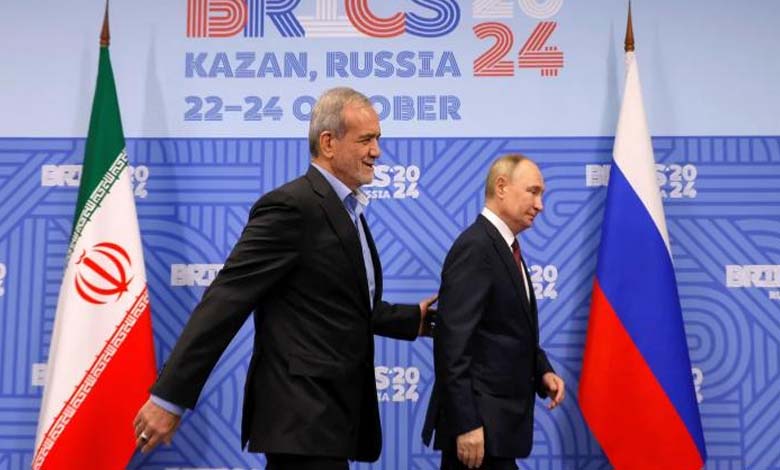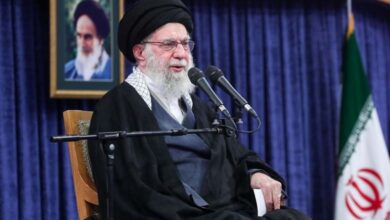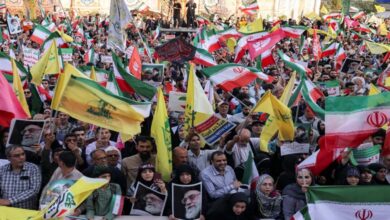Iran and Russia: A ‘Fragile’ Partnership at Risk of the ‘Wedge of Discord’

At first glance, Iran and Russia‘s relations appear strong, moving toward a “permanent partnership.” However, historically, they remain “fragile” and susceptible to a “wedge of discord.”
-
Ukraine Demands Liquidation of Iranian Arms Factories to Prevent Arming Russia
-
Russia and Iran expressed their concerns about Syrian and Libyan fighters in Nagorno-Karabakh
Since the onset of the war in Ukraine, Russia has opened joint channels with Iran. Moscow has provided Tehran with military support, diplomatic cover, and intelligence, while Iran has reciprocated by supplying Russia with its weapons and amplifying Kremlin propaganda, according to Foreign Affairs.
For instance, in July 2022, Iran’s Supreme Leader Ali Khamenei described NATO as a “dangerous creature” and claimed that if Russia had not acted first, the West would have triggered the war in Ukraine regardless.
Observers in both nations believe this partnership is unsurprising, as the two states are staunch adversaries of the West. Since 1979, Iranian leaders have been deeply hostile toward the United States.
-
“Iran’s Nuclear Program”: IAEA Condemnation and Tehran’s Response
-
Intercontinental Missile Warfare: Russia Launches a Ballistic Missile at Ukraine
Meanwhile, Russian President Vladimir Putin has argued that the war with Ukraine is, in reality, a conflict with NATO, which aims to destroy Russia.
Both nations are “pariahs” in the West, subjected to severe sanctions, and in desperate need of allies, according to Foreign Affairs.
However, despite their similarities, the partnership between Iran and Russia may prove more fragile than it appears. While they share a common enemy and similar political systems, their long history of conflict has not entirely faded.
-
Weapons and Cancelled Debts: Biden’s “Final” Gifts to Ukraine
-
“Amending the Nuclear Doctrine”: Russia Prepares to Put the World “on the Brink of a Volcano”
Economically, both are oil-exporting states competing in the same markets. Politically, they vie for dominance in the Caucasus and Central Asia and have differing approaches to the Middle East.
In reality, beyond undermining Western dominance, the two countries lack a coherent international agenda. Even regarding the U.S., their strategies differ.
For example, during the 2024 U.S. presidential election, Russia sought to help Donald Trump, while Iran allegedly plotted his assassination, according to the U.S. Department of Justice.
-
Russia and Ukraine Exchange Records in the Drone Warfare
-
Wall Street Journal: Trump to Renew “Maximum Pressure” Campaign against Iran
Intrinsic Contradictions
According to Foreign Affairs, while Iran and Russia might draw closer in the coming years, deeper cooperation is far from guaranteed. Despite its advantages, their alliance is riddled with intrinsic contradictions, mutual distrust, and competing interests that could undermine its sustainability.
One major obstacle is their shared history. Geographically linked by the Caspian Sea, the two nations spent centuries as imperial rivals. Soviet forces occupied part of Iran during World War II, and Iran aligned with the Western bloc throughout most of the Cold War.
This changed after 1979, but Iran’s new religious leadership showed little interest in aligning with the secular USSR. Ayatollah Khomeini, Iran’s first Supreme Leader, despised Washington but also referred to Moscow as the “lesser devil.”
-
Iran’s Nuclear Program: What is the “Wisest” Path for the U.S. to Face It?
-
Russia and Ukraine: Will the Third Winter Melt the “Ice of War”?
After the Cold War, the two nations struck awkward compromises. For instance, Iran ignored Chechen Muslims’ aspirations for independence in the 1990s, despite its constitutional commitment to “brotherhood toward all Muslims.”
Today, they remain competitors in several areas. In the Caucasus, Moscow supports a corridor linking Azerbaijan to Turkey, which Tehran opposes.
Economic Rivalry
Despite talks of trade partnerships, both states are dominated by hydrocarbon industries. Constrained by Western sanctions, they compete for the same limited markets, such as China, whose slowing economy may reduce energy demand.
-
Pokrovsk… the “Gateway to Donetsk” that Russia is striving to seize
-
Iran Prepares for Military Response to Potential Israeli Attack Amid Warnings of Widespread Escalation
A ‘Wedge of Discord’
Foreign Affairs argues that Washington should exploit these differences to “drive a wedge between Moscow and Tehran” without courting either government. This could involve energy policies lowering oil prices and media campaigns highlighting their regional disagreements.
In conclusion, despite their current alliance, Iran and Russia’s differences may prevent them from forging a durable partnership, potentially avoiding a more unstable and violent world.












